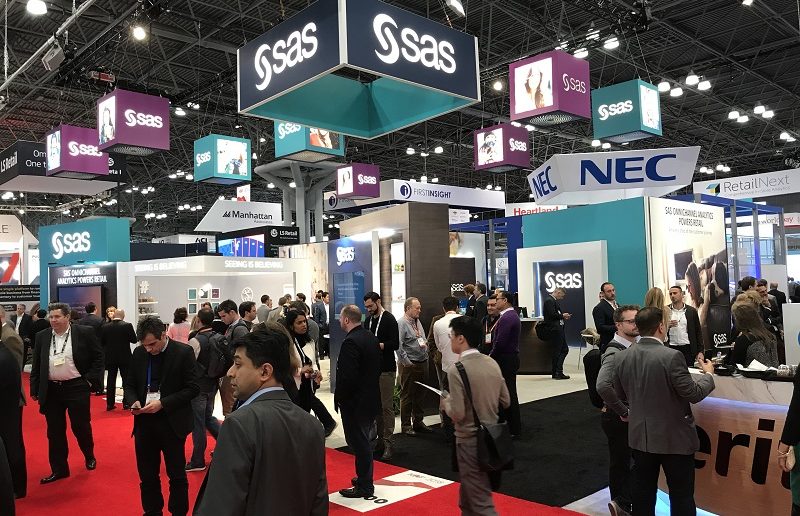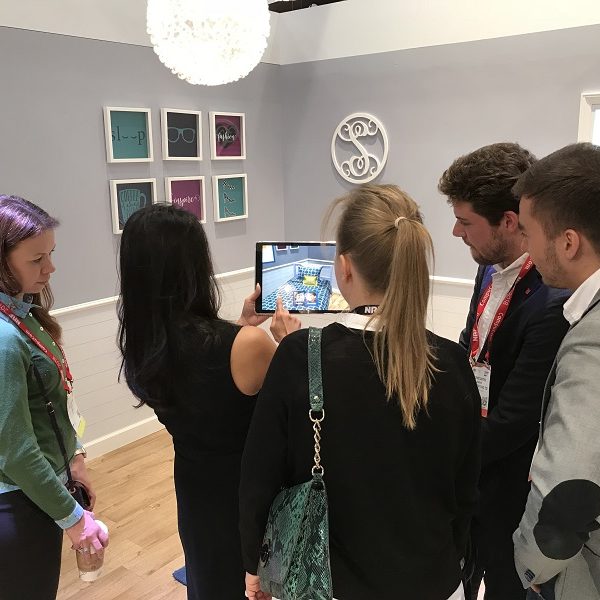Enochlophobia. It means “fear of crowds,” and I have it. I wouldn’t be caught dead anywhere near Times Square on New Years’ Eve, and how did I ever endure the stadium-sized rock concerts of my youth? I’m thinking all this as I navigate the sea of people at the National Retail Federation’s annual Big Show at the Javits Center. Representing retailers across market segments and geographies, attendees traverse the show floor en masse, making uncomfortable human contact inevitable. It’s flu season, I think.
Armed with a sample-sized Purell I make my way to the innovation lab, where a crowd observes waist-high robots replenishing shelves in a pretend store, their movements seemingly unbidden. Further on there’s a holographic fitting room, and next door a voice-directed planogram. The shopper experience is the clarion call of the new retail and conference goers are tuning in. They’re not content in merely knowing what’s new: they want to see it in action.
Are retailers ready for artificial intelligence? Let's ask them.
Artificial intelligence, machine learning, virtual reality, voice recognition, and robotics demonstrations create a decidedly tech conference vibe. Presentations on open source, customer experience and predictive analytics share the agenda with traditional inventory management and supply chain optimization lectures.
Using the teeming crowd as both a distraction and an opportunity, I decide to conduct an informal survey. I ask people how prepared their companies are to adopt some of these emerging technologies. Two glibly reply that they are ready right now, but provide scant details about adoption plans. A few others shake their heads, as if the digital age were eluding them.
Most of the respondents are realistic. I chat with a merchandise manager from a specialty retailer. We watch a woman wearing an AR headset choose furniture for a virtual living room. “Yeah, this is all important and could even competitively differentiate us,” he says. “But I’m still fighting some old battles. I’m trying to convince IT to give us customer purchase history. Our segments aren’t reliable without it.” He looks at me with a lopsided grin and shrugs. “We’ve got some blocking and tackling left to do.”
Other conversations echo this blend of excitement and pragmatism. People express distrust of the recurring product demos. Others bemoan the state of their data. “We can’t even THINK about AI until we get more and better data,” a business analyst explained as we ascended an escalator. “It would be an intellectual exercise. And we have enough of those already.”
- NRF attendees visit the SAS booth.
- Checking out a virtual reality shopping demo.
What about retail executives? I'll talk to them too.
Later I compare notes with friends over drinks. Executives all, they have been zeroing in on technologies that might help them leapfrog their competitors, often struggling to convey the importance of digital to their own leadership. “The bottom line is that our customers are getting smarter and demanding more from us,” said the CIO at a noted online retailer. “We need to be smarter and faster, while staying relevant.”
These days, that’s true in every industry. We all agree these are lofty goals that require honesty about incumbent capabilities, strategic focus, and constant missionary work. Then we collect our coats, say our goodbyes, and plunge back into the bustle of New York.
How about you? Are you ready for AI? If not, read this handy guide from my colleague Kimberly Nevala: Making Sense of AI. It includes a practical definition, everyday examples and an honest assessment of AI capabilities in the market today.




2 Comments
it is hard to impress modren people with artificial intelligence. i am the student of NCBA&E Multan.
Artificial intelligence has been with the human race for a long time. There are many people who are leaders of the world who speak with seeming intelligence but have led the world to the verge of turning the Earth into a cesspool. Led by uncontrolled desires and unquenchable greed, dumping toxic materials into our rivers and oceans and developing uncontrollable nuclear wastes stockpiles are signs of all the artificial intelligence the human race will ever need. Computers only do what they are programmed to do. What is needed is a science based on basic truths which are the essence of all religions.
STUDENTS OF NCBA&E MULTAN
MSCS 4th Smester
Supervised by Mr. Asim Rajwana